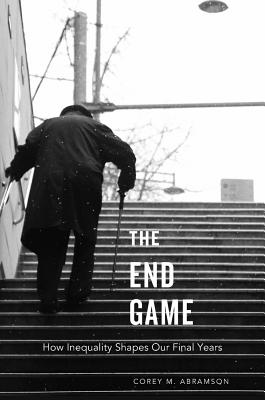

 Harvard University Press
Harvard University Press
The End Game: How Inequality Shapes Our Final Years


Key Metrics
- Corey M Abramson
- Harvard University Press
- Hardcover
- 9780674743953
- 9.5 X 6.3 X 1 inches
- 1.1 pounds
- Social Science > Gerontology
- English
 Secure Transaction
Secure TransactionBook Description
Senior citizens from all walks of life face a gauntlet of physical, psychological, and social hurdles. But do the disadvantages some people accumulate over the course of their lives make their final years especially difficult? Or does the quality of life among poor and affluent seniors converge at some point? The End Game investigates whether persistent socioeconomic, racial, and gender divisions in America create inequalities that structure the lives of the elderly.
Corey Abramson's portraits of seniors from diverse backgrounds offer an intimate look at aging as a stratified social process. They illustrate that disparities in wealth, access to health care, neighborhood conditions, and networks of friends and family shape how different people understand and adapt to the challenges of old age. Social Security and Medicare are helpful but insufficient to alleviate deep structural inequalities. Yet material disadvantages alone cannot explain why seniors respond to aging in different ways. Culture, in all its variations, plays a crucial role.
Abramson argues that studying the experience of aging is central to understanding inequality, in part because this segment of the population is rapidly growing. But there is another reason. The shared challenges of the elderly--declining mobility and health, loss of loved ones and friends--affect people across the socioeconomic spectrum, allowing for powerful ethnographic comparisons that are difficult to make earlier in life. The End Game makes clear that, despite the shared experiences of old age, inequality remains a powerful arbiter of who wins and who loses in American society.
Author Bio
Corey M. Abramson is an associate professor of sociology at the University of Arizona. Professor Abramson’s research uses a combination of quantitative, qualitative, and computational methods to understand how persistent social inequalities structure the life course and are reproduced over time.
His comparative ethnography on aging and inequality, The End Game: How Inequality Shapes Our Final Years was published by Harvard University Press and received the Outstanding Publication Award by the American Sociological Association Section (ASA) on Aging and the Life Course, featured in national media outlets including The New York Times and The Atlantic, and translated into Korean. Abramson’s methodological works—including pieces published in Sociological Methodology, Health Affairs, Ethnography, BMJ Open, and Beyond the Case (Oxford University Press, co-edited with Neil Gong)—focus on (1) articulating the value of methodological pluralism and (2) developing strategies for integrating computational techniques to improve the scalability, transparency, and replicability of multi-site ethnographic projects.
Source: The University of Arizona - School of Sociology
Videos




Community reviews
Write a ReviewNo Community reviews